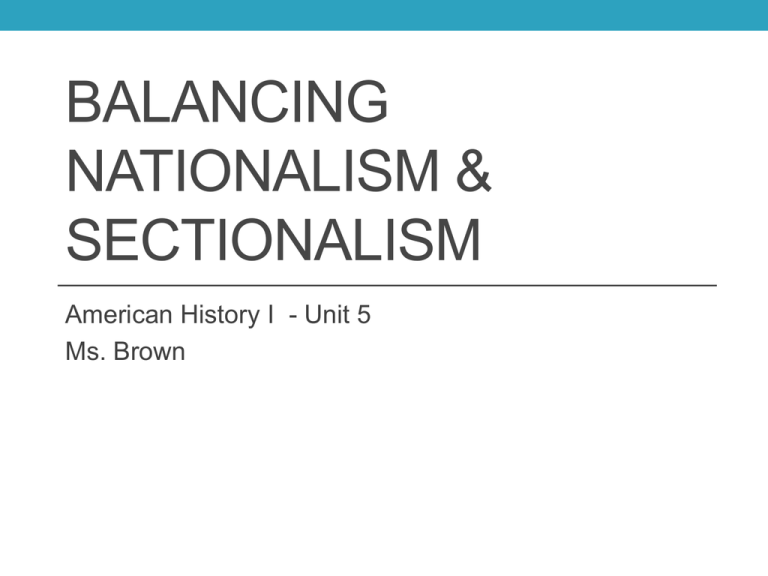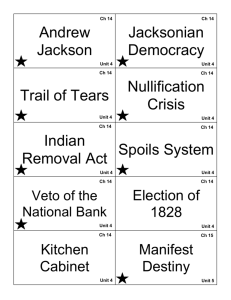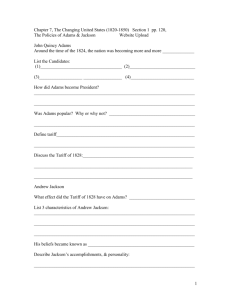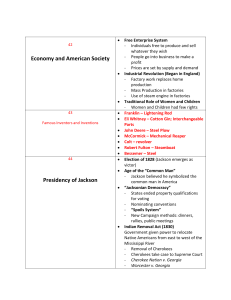Powerpoint
advertisement

BALANCING NATIONALISM & SECTIONALISM American History I - Unit 5 Ms. Brown 5.3 – THE AGE OF JACKSON Review • Define nationalism. • The belief that the nation’s interests should be valued over the interests of regions OR other countries • Who was Monroe’s Secretary of State? • John Quincy Adams • What did the US gain in the Adams-Onis Treaty with Spain? • Florida • What topic caused much debate in Congress in 1820? • Slavery – allow/ban in new territories and states? • What 2 things did the Missouri Compromise do? • Maine – 12th free state and Missouri – 12th slave state (Kept balance in Congress) • Missouri Compromise Line – slavery banned above the line, slavery allowed below the line. Election of 1824 J. Q. Adams VS Andrew Jackson Jackson wins popular vote (more citizens voted for him). No majority in the Electoral College House of Representatives votes on POTUS Election of 1824 • House of Representatives (under Henry Clay’s direction) voted on Adams. • Henry Clay (the House Speaker) had the power to sway the votes in the House of Representatives to his chosen candidate. • J.Q. Adams = 6th POTUS! • Chose Henry Clay to be his Secretary of State “I cannot believe, that the killing of twenty-five hundred Englishmen at New Orleans qualifies him for the various difficult and complicated duties of the presidency.” - Henry Clay speaking about Jackson The Corrupt Bargain • Jacksonians (Jackson’s followers) believed that Adams made a deal with Clay and stole the presidency from Jackson called the Election of 1824 “The Corrupt Bargain.” X J.Q. Adams Clay POTUS Sec. of State • Jacksonians joined the Democratic-Republican Party. • Main goal – sabotage Adams’ presidency and oppose all of his policies. Expanding Voting Rights • By 1828, many states decreased voting requirement larger voting population • Most states dropped the property-ownership requirement universal white male suffrage • 1824 – 350,000 white males voted • 1828 – over 1,000,000 white males voted • Free blacks, slaves, and women = no voting rights Election of 1828 • Expanded voter rights more “average” and “common” people voting • Election of 1828 – J.Q. Adams vs Jackson • Jackson’s 1828 POTUS Campaign • Wanted to appeal to the common man • Claimed man of humble origins (even though he was actually a wealthy plantation owner) • Called Adams an “intellectual elitist” who didn’t understand the troubles of the common American. Election of 1828 • Jackson = 7th POTUS! • Won by a landslide The Spoils System • “To the victor belong the spoils of the enemy.” • The winner gets everything that goes with the victory. • Jackson won POTUS, and gets all the presidential power to replace federal positions. • Spoils system – giving jobs and appointments to supporters/followers rather than to people based on qualifications • Jackson fired nearly 10% of Adams’ federal workers • Gave the jobs to his own supporters and friends • Created the “kitchen cabinet” – Jackson’s close group of friends who gave him advice and acted like a cabinet. • “snuck in to the White House through the kitchen” Jackson The White House Pig = the “spoils” “Fraud,” “Bribery,” “Plunder” “To the Victor belong the Spoils” Jackson and Native Americans • After War of 1812, some Native American tribes adopted aspects of American culture. • “5 Civilized Tribes” – Cherokee, Choctaw, Seminole, Creek, and Chickasaw Tribes • Lived in the southeast US Indian Removal Act of 1830 • Jackson didn’t think assimilation (Natives joining American culture) was “right” • Protecting the original tribal areas would require too many federal troops and money • Jackson’s plan – Indian Removal Act of 1830 - forced movement of Native Americans to western areas with government funded treaties • Some tribes quickly agreed to the treaties and moved west voluntarily • Some tribes resisted and were forcibly moved by US troops Worcester v. Georgia (1832) • Following the Indian Removal Act, Georgia passed its own laws forcing the removal of Native tribes within the state borders. • Cherokee members refused to move and claimed that they were a “nation” that could not be removed without their consent. • The Cherokee decided to fight back using the American legal system. Worcester v. Georgia (1832) • Cherokee tribe teamed up with Samuel Worcester, a teacher who had been jailed for teaching Natives without a state issued license. • Worcester = a US citizen the SCOTUS would HAVE to honor the rights of a citizen to be heard in court. • Worscester sued Georgia on behalf of the Cherokee. Worcester v. Georgia (1832) • Chief Justice John Marshall and the SCOTUS ruled in favor of WORCESTER and the Cherokee. • Cherokee = a distinct and independent nation that is NOT subject to Georgia’s OR the US’s laws. • Jackson REFUSED to obey the SCOTUS’s decision. “ John Marshall has made his decision, now let him enforce it.” - Jackson on the Worcester v. Georgia ruling The Trail of Tears • A small group of Cherokee stopped resisting the relocation and signed a treaty with Jackson, agreeing to move for $. • The small group was not at all representative of the entire Cherokee population. • Jackson (and later Van Buren, 8th POTUS) forced the rest of the Cherokee from their land. Trail of Tears • Oct-Nov 1838 (winter), Jackson no longer POTUS • Groups of Cherokee natives forced relocated to western land • 800 miles – mostly by foot • Harassed and abused by US troops and outlaws • ¼ died along the way “Children cry and many men cry, and all look sad like when friends die but they say nothing and just put heads down and keep on go towards West. Many days pass and people die very much.” - Trail of Tears survivor






